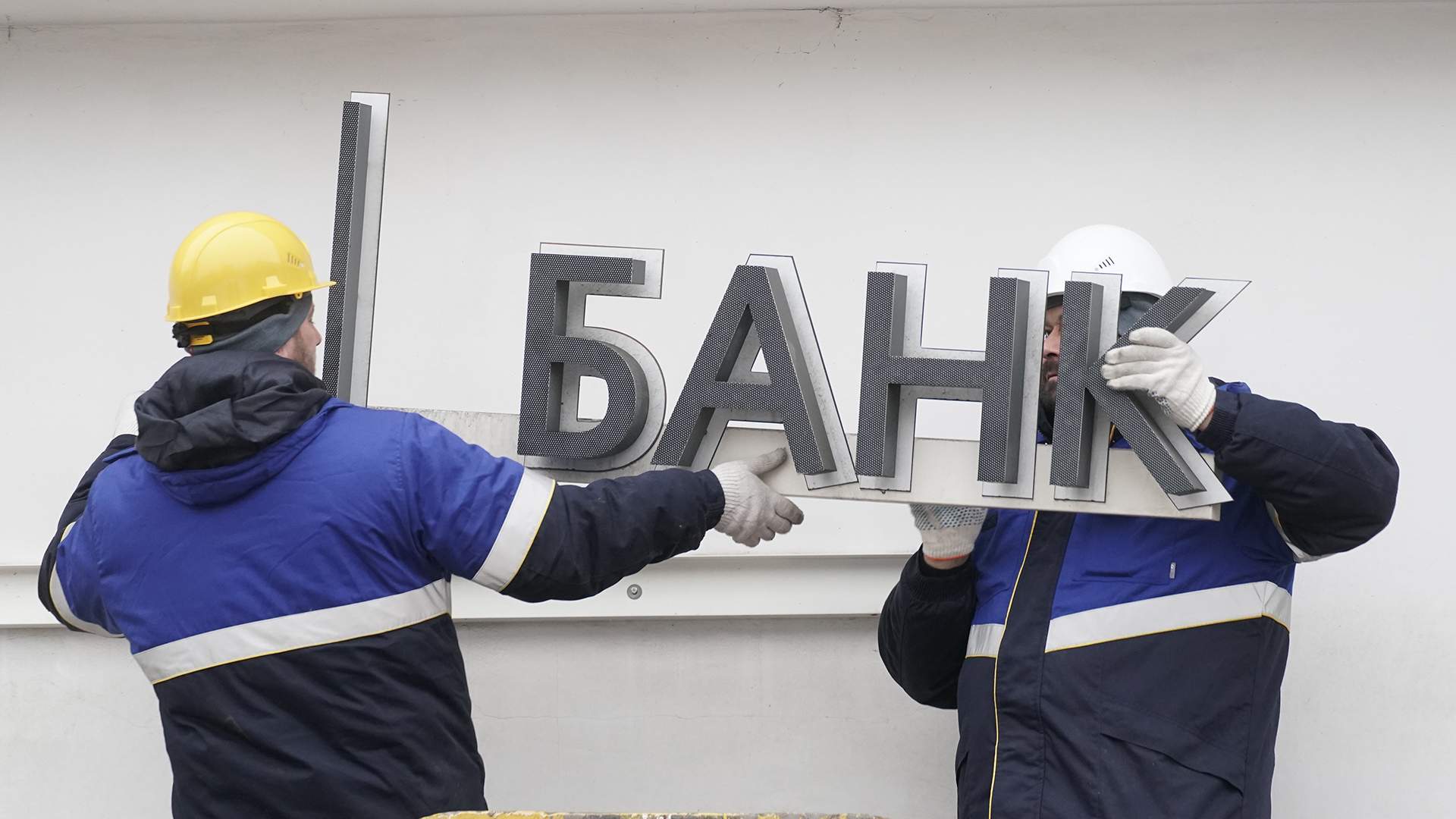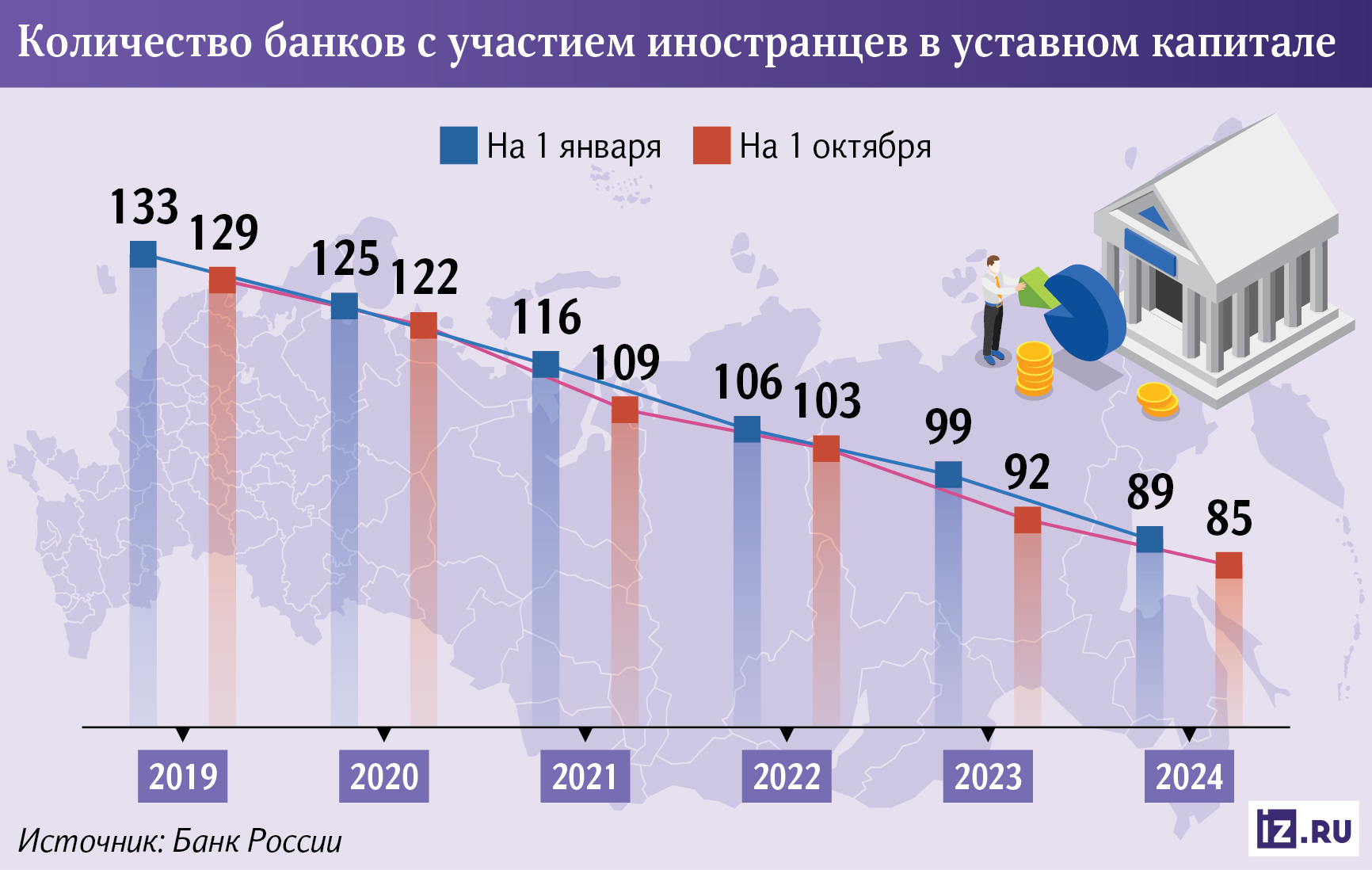- Статьи
- Economy
- Move abroad: the number of banks with foreign participation has fallen to a 10-year low
Move abroad: the number of banks with foreign participation has fallen to a 10-year low

The number of banks with the participation of foreigners in Russia fell to 85 at the beginning of October 2024. This is the minimum for ten years, according to the Central Bank statistics analyzed by Izvestia. Back in January 2024, there were 89 of them. Among the players that left last year are Swiss Cramer & Cie SA and American Express Bank. The trend is related to the fact that foreign regulators are putting more and more pressure on parent companies against the backdrop of sanctions, forcing them to close their business in Russia. In addition, it is becoming less and less comfortable for them to work here, because the world's reserve currencies have become "toxic" for Russians. Experts believe that the trend of foreign credit organizations leaving the country will continue in the future. How the current situation will affect the Russian banking sector - in the material of "Izvestia".
Foreign banks in Russia
In Russia, the number of banks with foreign participation in the authorized capital is gradually decreasing. If in January 2024 there were 89 such banks, then at the beginning of October last year, they have already become 85 - this is the minimum for the last ten years, according to the latest current data from the Central Bank. Of these, 78 have a universal banking license, and another seven have a basic license (which restricts certain operations, such as opening branches).
The reduction in the number of banks with foreign capital is smoothly occurring against the background of the sale of Russian assets by foreign owners, primarily from unfriendly countries, said Ivan Uklein, senior director for bank ratings at Expert RA.
For example, the Russian assets of British HSBC were bought by Expobank - the deal was closed in May 2024. Apparently, its assets have already been integrated into the structure of the credit organization, said Natalia Milchakova, a leading analyst at Freedom Finance Global.
Another case is the change of ownership of Yandex-Bank. Netherlands-based Yandex N.V. closed a deal to sell its Russian business (including the credit organization) to the corporation's top management represented by a consortium of buyers of the ZPIF "Consortium.First". The deal was finalized in July 2024. The financial organization continues to operate in Russia, but now without foreign participation, explained Natalia Milchakova.
In addition, two more foreign banks liquidated their Russian branches during this period. The first to close its representative office in the Russian Federation in 2024, in early January, was Swiss Cramer & Cie SA, said Alexei Tarapovsky, founder of Anderida Financial Group.
Last July, the Russian "subsidiary" of the American Express payment system - American Express Bank - filed a liquidation petition (the payment system itself stopped working in Russia in 2022). This is the first case when a credit institution from the list of 45 players with foreign participation, defined by presidential decree, did not sell its business, but voluntarily surrendered its license.
Since August 2022, Russia has had a restriction on transactions with stakes held by foreigners linked to unfriendly countries. In October of the same year, Russian President Vladimir Putin approved a list of banks that fall under the ban. The list includes 45 organizations, including Russian branches of Swiss Credit Suisse, German Deutsche Bank, American Citibank, Austrian Raiffeisenbank and Italian UniCredit. Transactions with them can be conducted only after obtaining special permission from the president.
How the departure of foreign banks will affect the Russian market
The volume of operations of banks with foreign participation is gradually decreasing in the Russian market, said Valery Piven, Managing Director, Head of the group of ratings of financial institutions of ACRA. According to him, this is largely due to the restrictions that the regulators of parent companies impose on the activities of their "subsidiaries" in Russia.
For example, Unicredit and Raiffeisenbank have significantly reduced their activities in Russia under pressure from the European Central Bank, recalled Maxim Kolyadov, head of retail banking at insurance broker AMsec24.
Since 2022, when the US and the EU started imposing sanctions against the Russian banking sector, subsidiaries of international credit organizations have been bearing the risks of secondary sanctions, explained Natalia Milchakova of Freedom Finance Global.
In addition, banks from unfriendly countries are becoming less and less comfortable working in Russia. Almost all global reserve currencies have become "toxic" for Russians, and it is now unprofitable and risky for foreign financial institutions to operate on the local securities market, the expert emphasized. She explained: their Russian clients may have foreign securities in European or American depositories, and vice versa - securities of foreign issuers in Russian depositories.
It is not very profitable for foreign banks to issue "Mir" cards, the expert noted. Now they are not accepted in many places abroad, and the new "plastic" of international payment systems in Russia is almost never issued.
For the Russian banking system, the departure of such players is not critical - their main operations are taken over by credit organizations of the Russian Federation, said Valery Piven from ACRA. In addition, the vast majority of foreign banks were aimed at servicing legal entities related to their owners, added Alexei Tarapovsky from Anderida Financial Group.

In his opinion, the reduction in the number of banks with foreign participation in the authorized capital will continue. For example, only on January 13, 2025, French Natixis closed the sale of its Russian subsidiary bank. The new owner of Natixis Bank JSC became a domestic company "Bureaukrat". It received presidential authorization to buy the business in December last year.
Further development of the situation will depend on the overall political situation and sanctions against Russia, added Alexei Tarapovsky. In September 2024, foreign banks were allowed to open branches in Russia again. This is less costly than setting up subsidiaries. However, the possible appearance of branches is unlikely to radically change the situation on the market, says Valery Piven from ACRA.
The negative side of foreign players leaving Russia is the reduction of competition in the market, said Natalia Milchakova from Freedom Finance Global. According to her, for legal entities this may lead to an increase in bank commissions and tariffs. However, individuals will not be affected.
Переведено сервисом «Яндекс Переводчик»





